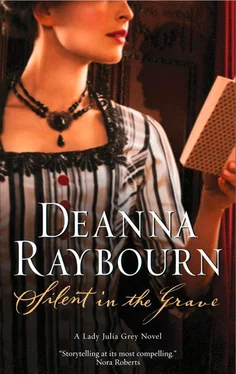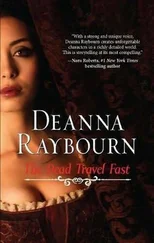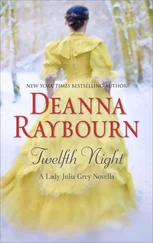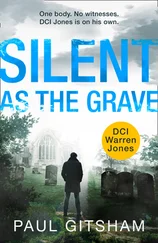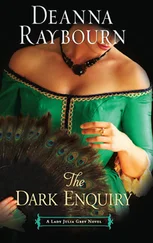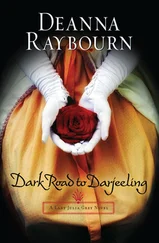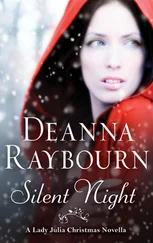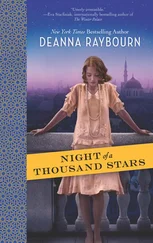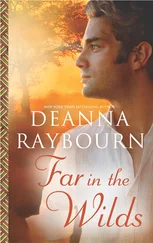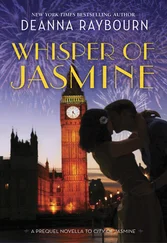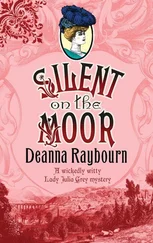“Darling, is it really so awful?” called a voice from the doorway. I looked up.
“Portia. I did not know you were here.”
“I told Aquinas not to announce me. I wanted to surprise you.”
My sister entered, trailing black scarves and feathers and a cloud of musky rose perfume. She was the only woman I knew who could make mourning look glamorous. She settled herself into Mother’s armchair, cradling her ancient pug against her chest.
“Did you have to bring that revolting creature?”
She pulled a face and nuzzled him. “You shouldn’t speak so of Mr. Pugglesworth. He quite likes you.”
“No, he doesn’t. He bit me last month, remember?”
Portia clucked at me. “Nonsense. That was a love nibble. He loves his Auntie Julia, don’t you, darling?” She cooed at him for a minute, then settled him onto my favorite cushion.
“Oh, Portia, please. Not that cushion. He’s flatulent.”
“Don’t be horrid, Julia. Puggy is nothing of the sort.”
I put my head back down on my desk. “Why did you come?”
“Because I knew you would be contemplating suicide in some highly uncreative fashion and I wanted to help.”
I raised my head just enough to see her. “No, not yet. But I will confess to being completely anguished. Portia, what am I to do?”
She leaned forward, her March-green eyes sparkling. Portia had always been the most beautiful of my sisters, and she knew just how to use her charms to greatest effect.
“You can begin by leaving off the self-pity. It is unbecoming,” she said, her tone faintly reproving. “And don’t pout, either. I tell you these things because someone must. You have had a chance to accustom yourself to Edward’s loss. It is time you admitted it is not a crushing blow.”
I sighed and rested my chin in my hands. “I know. It just feels so awful, so disloyal to admit that I actually feel rather liberated by it.”
“Not at all. How do you think I felt when Bettiscombe died?”
“A bit of a different situation, I think,” I put in, remembering her aging, infirm husband. “It was a merciful release when Bettiscombe passed away. He’d been malingering for years.”
“So had Edward,” she said, a trifle acidly. “We both married sickly men, my darling. The only difference was that we all thought Bettiscombe was hypochondriacal.”
He had been, poor thing. Always taking his temperature and palpating his pulse. He had been forty-five when Portia married him, and he had seemed robust enough at the time. We all thought his throat drops and chest plasters a charming affectation. But during their first winter together at his home in Norfolk, he had taken a chill and promptly died, leaving Portia a rich widow of twenty.
Of course, Portia was not quite as distraught as she might have been. In London, Bettiscombe had been charming and waggish, ready for any jape, so long as he was well wrapped against draughts. In the country, he was a perfect mouse, rising at six and retiring by eight. He fretted over everything without the whirl of London distraction, and had left Portia too often in the company of his spinster cousin and poor relation, Jane. He died before the true nature of their relationship became apparent, and Portia lost no time in returning to London and bringing dear Jane with her to set up house together in the elegant town house Bettiscombe had left her. I knew my widowhood should not prove half so interesting to my family as Portia’s had.
“But you must have felt a tiny prickle of guilt,” I prodded her. Portia frowned. She never liked to be reminded of things she had tucked neatly away.
“Not guilt, not precisely,” she said slowly. “It was rather more complicated than that. But I had my sweet Jane for compensation. And I think you would do rather better if you counted your own advantages rather than mooning about trying to convince yourself that you have lost your one true love.”
“Portia, that is unspeakably cruel.”
Her eyes were sympathetic, but her manner was brisk. “I know that you wish to mourn Edward. He was a lovely person and we were all quite fond of him. But the man you buried was not the child you played with. Do not make the mistake of climbing into his grave and forgetting to live the rest of your life.”
My fingers were cramping and I realized that my hands were clenched. I rose. “Portia, I do not wish to speak of this now. Not to you, not to anyone. I shall conduct myself as I see fit, not to please you or Father or anyone else,” I finished grandly. I swept to the door.
“Hoorah,” she said softly, still not moving from Mother’s chair. “The little mouse is beginning to roar.”
I slammed the door behind me.
I spent the rest of the day in a high sulk, pouting about the evil treatment I had received at my sister’s hands and trying not to think about the possibility that she might have been correct. Edward had been my friend and companion when we were children together in Sussex. Our fathers’ estates had marched together, and Edward and his young cousin, Simon, had often joined in our games and theatricals and expeditions about the countryside. Like all of my sisters, I had come out into society, but I alone had held myself aloof from the few timid advances that had come my way. I suppose, having been raised on stories of knightly adventures and chivalric endeavors, I had been waiting for my very own storybook hero. But it seemed rather heroic when Edward left off of squiring some lissome beauty about the dance floor and came to sip punch with me where I sat by the potted palms. I was not like the other girls; I had no frivolous conversation or pretty tricks to win suitors. I had forthrightness and plainspoken manners. I had a good mind and a sharp tongue, and I was cruel enough to use them as weapons to keep the cads and rogues at bay. As for the young men I might have liked to partner me, I was far better at repelling than attracting. I did not swoon or carry a vinaigrette or turn squeamish at the mention of spiders. Father had raised us to scorn such feminine deceptions. Like my brothers, I wanted to talk about good books and urgent politics, new ideas and foreign places. But the young men I met did not like that. They wanted pretty dolls with silvery giggles and empty heads.
All except Edward. He always seemed perfectly content to sit with me, or even dance with me at considerable risk to his toes. We talked for hours of things other young men would never discuss. People began to talk, linking our names in gossip, and finally, during one particularly painful waltz, Edward smiled down at me and asked me to marry him.
I thought about it for a week. I considered hard whether or not I even wanted to marry. Father said little, but pointed me to the shelf in his library where he housed John Stuart Mill, Mary Wollstonecraft and even, shockingly, some Annie Besant. It was highly discouraging. There were few advantages to marriage for a woman. But there were fewer advantages to spinsterhood. I had already grown tired of the careful whispers behind the fans and the avid eyes that followed me. I was certain that they were saying that I was not the beauty my sisters were, that I would not marry as well as they. Those whispers and glances would follow me the rest of my life if I did not marry, speculating on what frightfulness of mine had driven away any potential suitors. I could not bear that. I was already conscious of how much we were talked about, of how amusing we were to society and how closely to the pale of respectability we walked. Only Father’s close association with the queen and the very ancientness of our lineage preserved us from becoming a complete joke. What I longed for most was normalcy—a quiet, average marriage in an unremarkable home where I could raise my perfectly normal children. That notion was more seductive to me than diamonds. And as a married woman I could travel more easily, have male friends without exciting suspicion, have my own home away from a family that was as maddening as they were delightful. A bit of quiet space to call my own, that is what marriage represented to me.
Читать дальше
